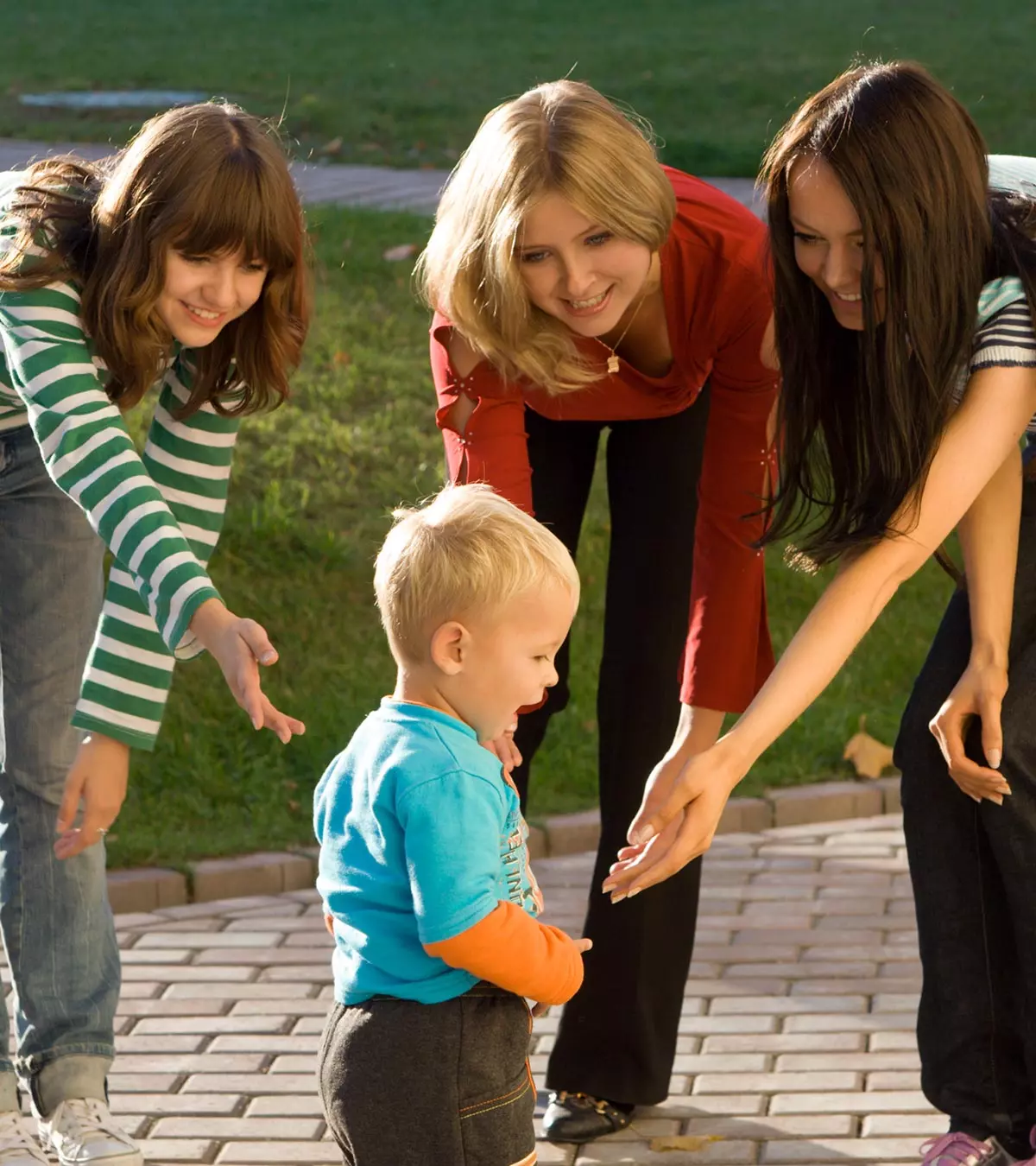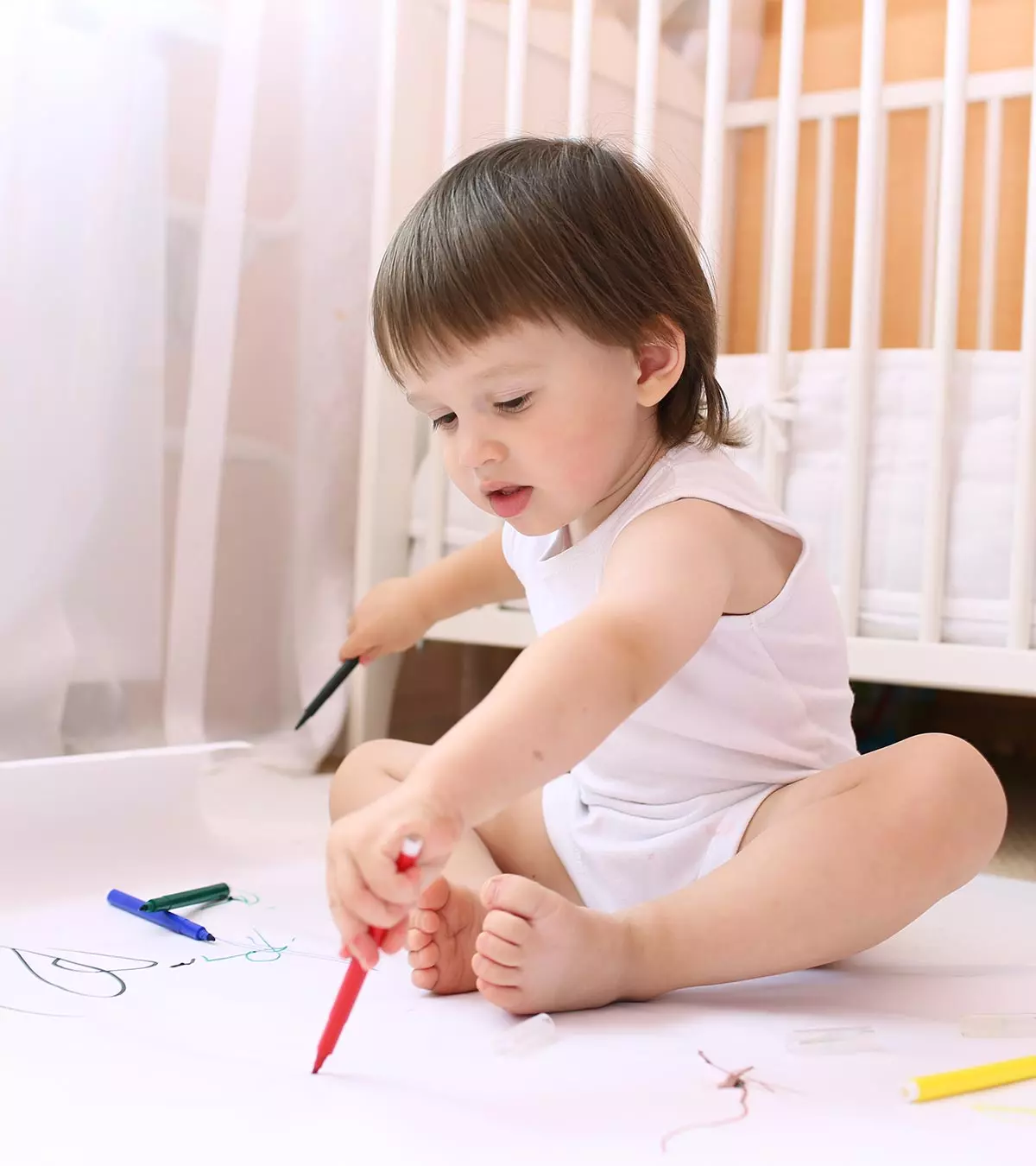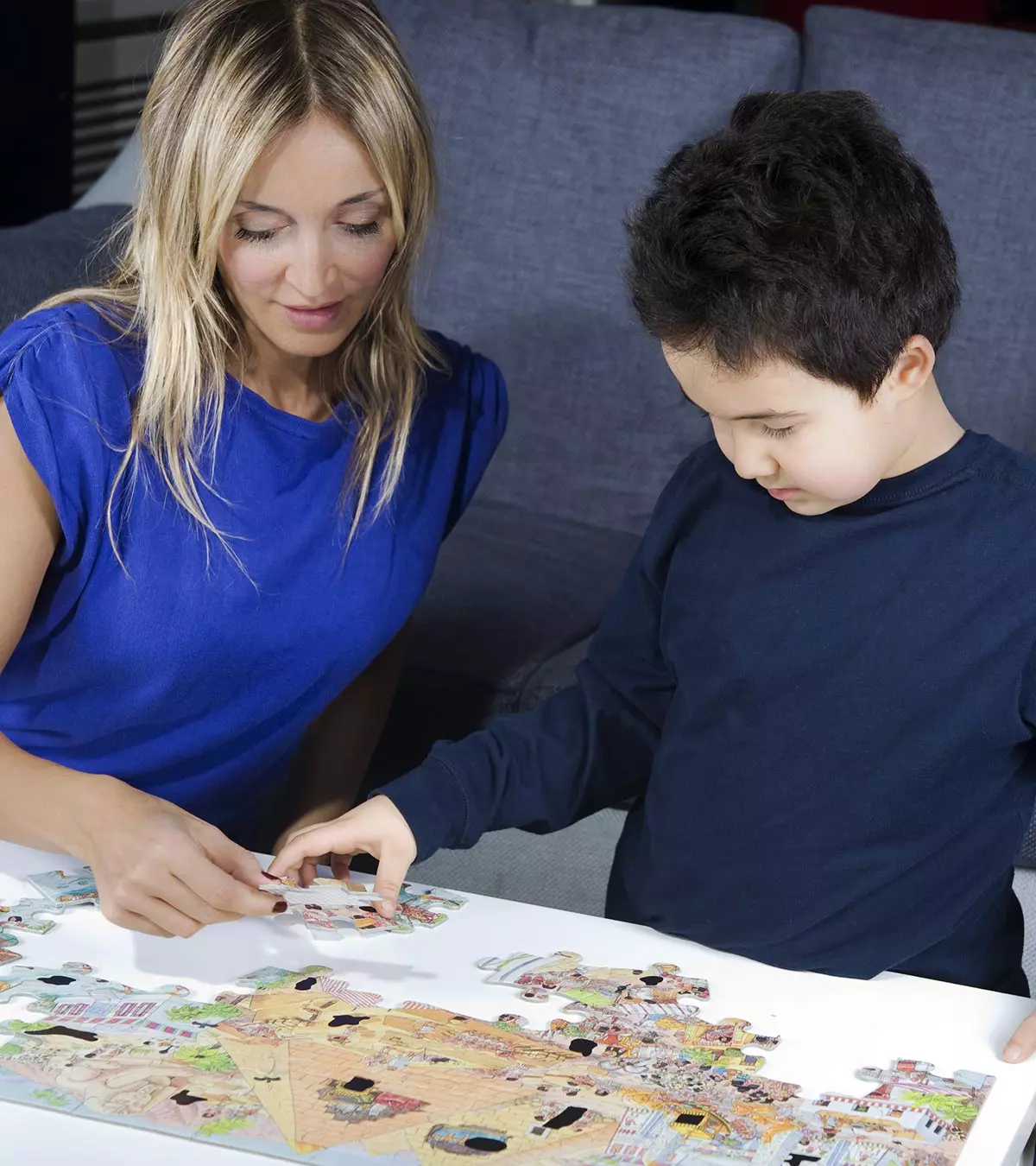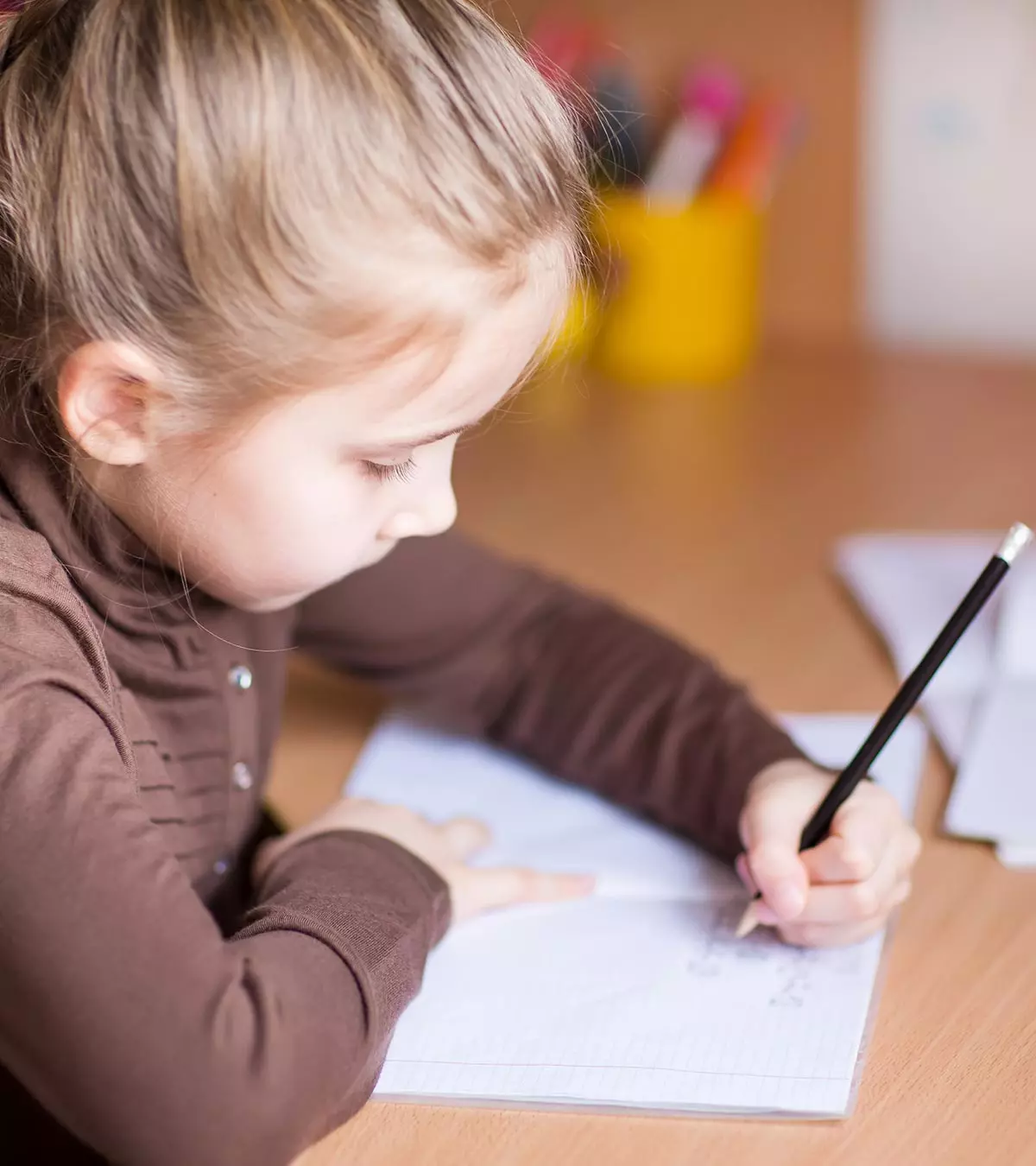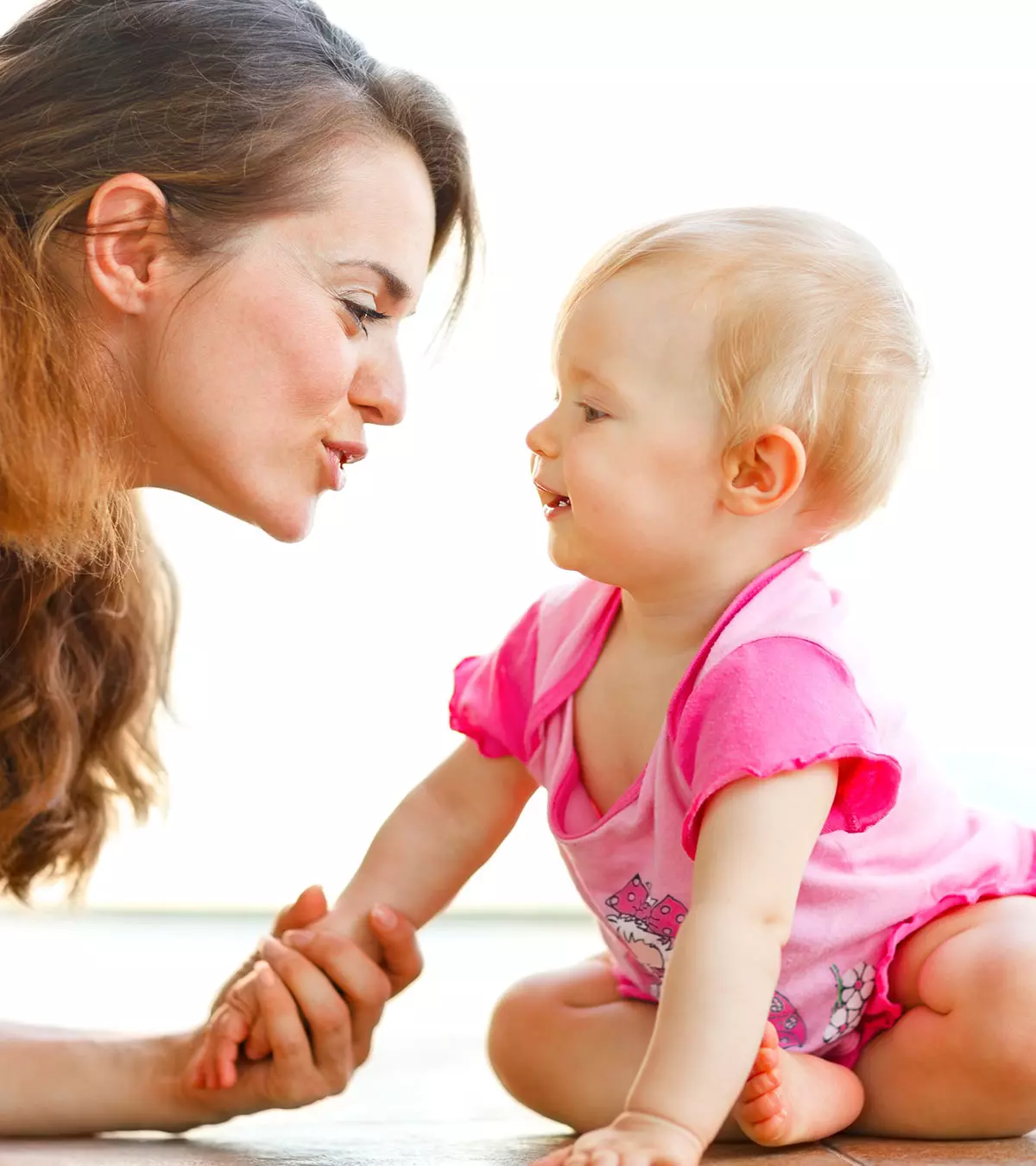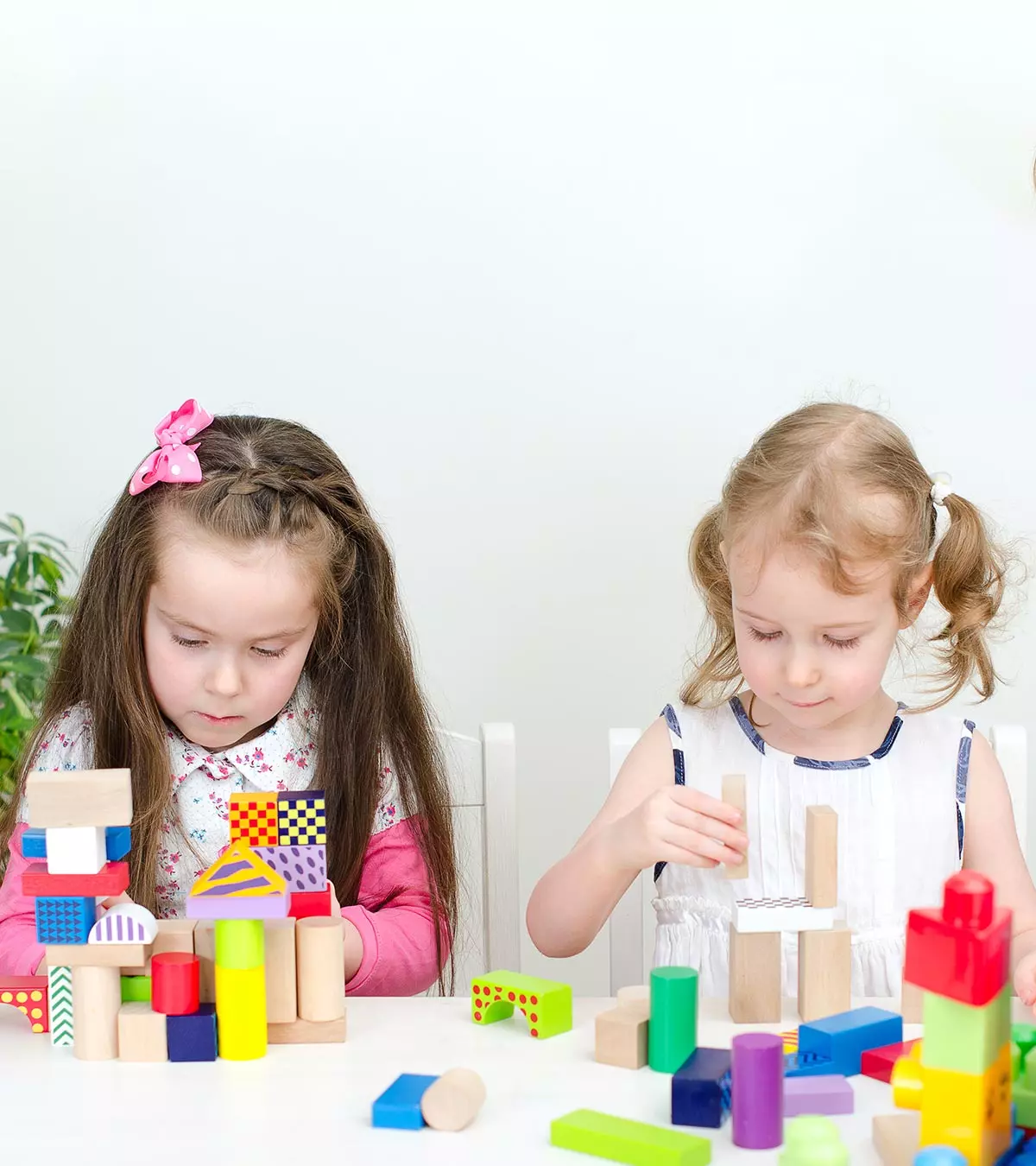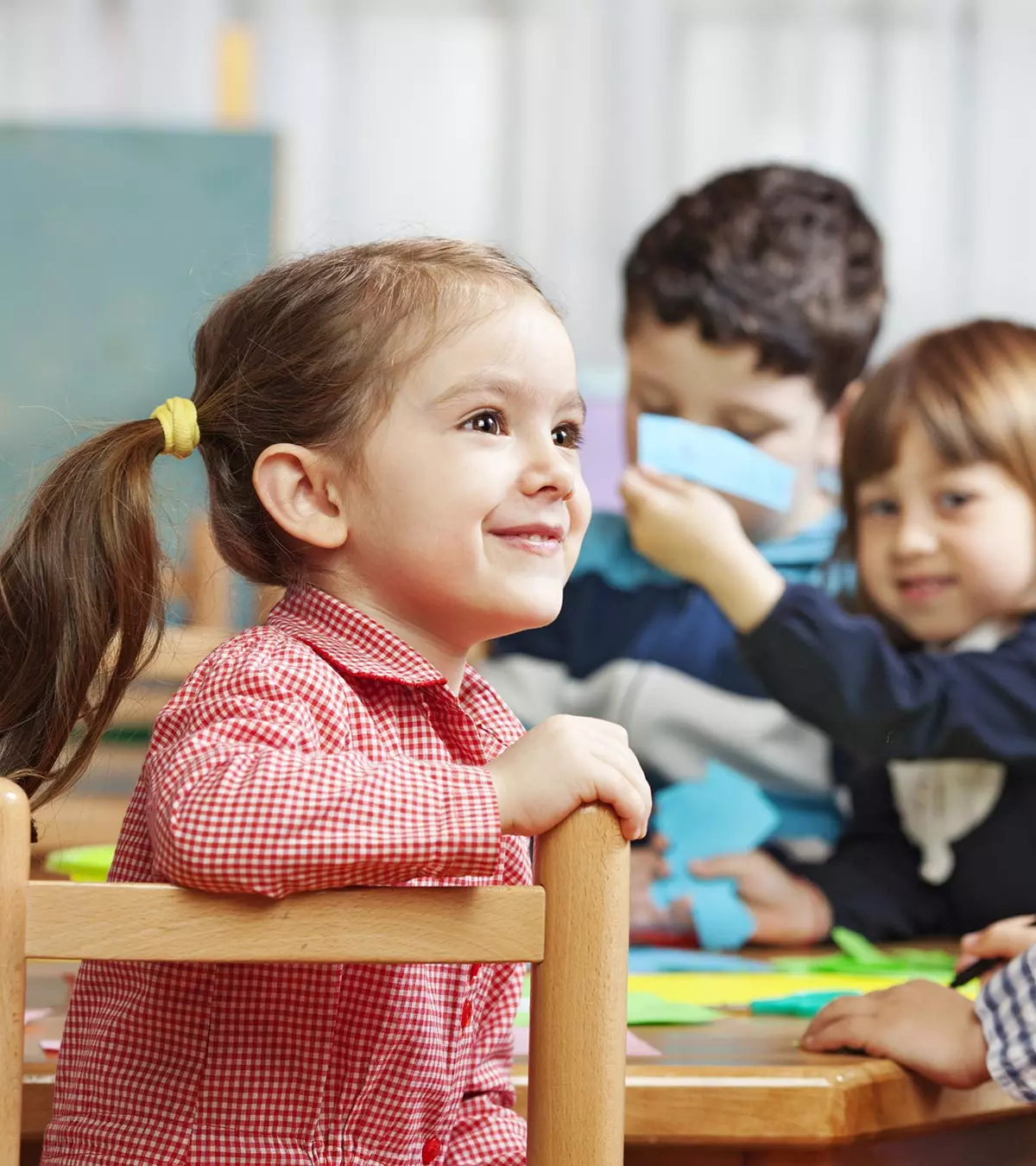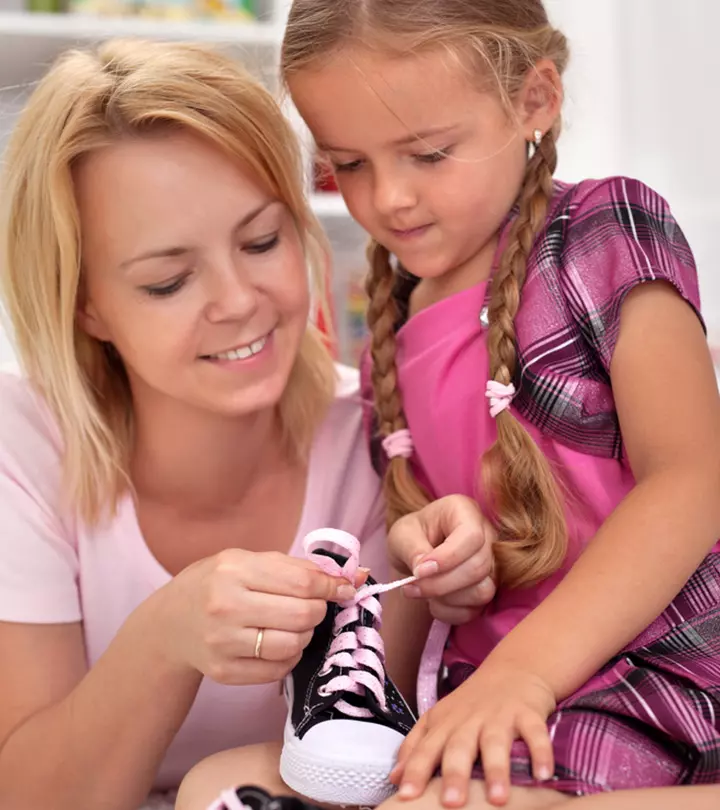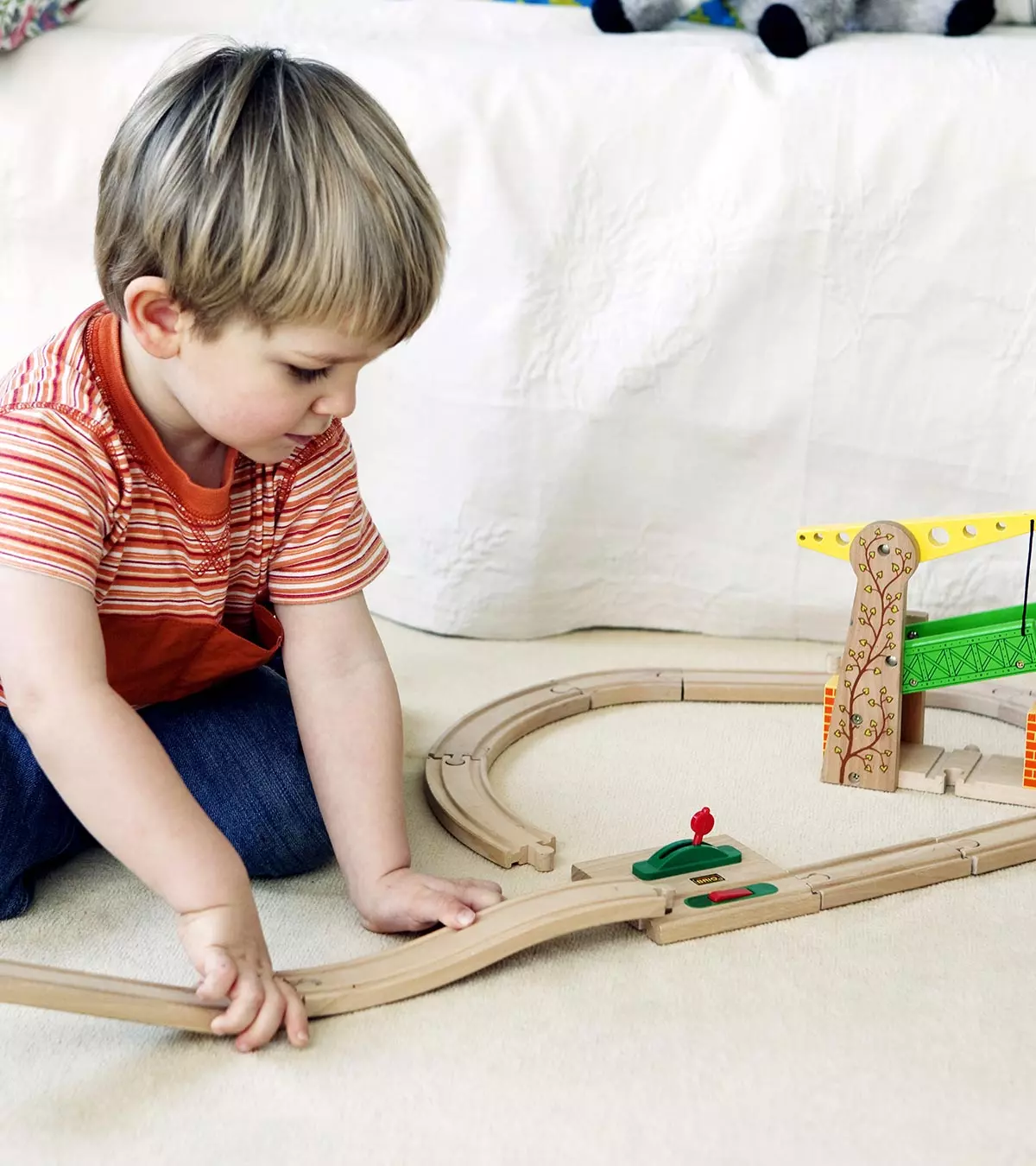
Image: Shutterstock
A toddler’s development often indicates whether they are growing healthily or not. Several achievements mark the toddlerhood phase between the ages of 25 and 27 months. For instance, toddlers are a lot more expressive than they were before. They utilize receptive language and speak while listening to you. As toddlers grow beyond their first year, you’ll observe a transformation in their hobbies and pastimes. Additionally, you may notice changes in their eating habits and food preferences. This stage marks their introduction to independence under parental supervision, enabling them to cultivate curiosity, fine-tune motor skills, spatial awareness, and communication abilities. Moreover, tracking their developing milestones can also help recognize any potential developmental delays, thus ensuring timely intervention. Read this post to know about various developmental milestones your toddler will attain at this age.

Key Pointers
- Adherence to routines, verbal and nonverbal expression, and readiness for toilet training are among the developmental and behavioral changes.
- Toddlers can squat for extended periods, walk fast, climb stairs, open cabinets, do simple puzzles, and turn pages in a book.
- They use a few words in speech, repeat words and phrases, and identify painful body areas.
- The toddler develops emotionally and socially by forming special attachments to favorite objects, showing empathy, exhibiting tantrums, and reacting to humor.
A Complete Guide On Toddler’s Development From 25 To 27 Months
Here is a quick look at what your toddler does At 25–27 Months:

The developmental/behavioral changes at this stage include the following (1) (2) (3) :
- They may not like changes.
- They follow a routine regarding playing, eating, etc.
- They can express themself in words and gestures.
- They can twist things such as doorknobs.
- They may show signs that they are ready for toilet training.
- They can repeat words.
- They may follow simple instructions.
 Point to consider
Point to considerToddler Development Between 25 And 27 Months
Here we shall take a detailed look into the 25–27-month-old developmental milestones and growth patterns of a toddler (1) (2) (3).
1. Motor And Physical Skills Development:
- You will find them squatting for long periods, indicating proper physical growth and gross motor development.
- Apart from walking fast without falling, they have also developed skills to walk downstairs, which requires more balancing skills.
- They can now open cupboards and drawers, solve small puzzles, and turn pages of a book. These are indications of proper fine motor skill development.
Advice for parents:
- Dance with your toddler at home.
- Take them to playgrounds and parks.
- Give them picture books and easy block puzzles to solve.
2. Eating Habits:
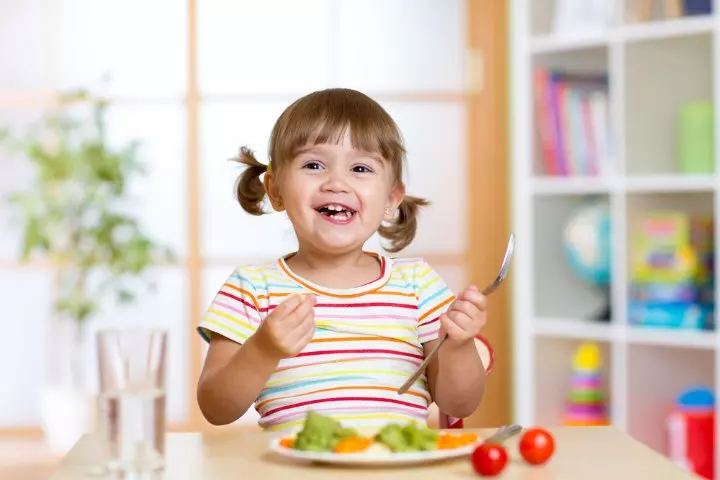
Proper nutrition is essential for a toddler’s growth and development. Therefore, you must ensure that your toddler is eating a well-balanced diet, rich in fruits, vegetables, whole grain, and other foods. However, toddlers at this age may not show much interest in new foods. So, you can serve something new with their favorite dishes (4).
- You can cut their food into funny shapes and use colorful food to make the plate look attractive.
- Your toddler at this age will be influenced by the way others eat.
- Start with small servings and add more food if they are hungry.
Advice for parents:
- Give them a variety of foods to choose from.
- Encourage eating on their own; you can have them sit with the family during dinner on a comfortable chair and hand them a spoon and fork.
- Don’t force them to eat.
3. Speech And Language Development:
Your toddler understands simple directions and can speak a few words at this age, which is crucial to their vocabulary expansion.
- If you attempt to read, speak, or write in front of them daily, they will soon learn those simple sentences, phrases, and words. You will find them repeating them again and again.
- They are now capable of naming objects you point at.
- They can also locate their body parts that have sustained injuries or are causing pain.
- Try to make them learn short poems.
Advice for parents:
- Read and recite rhymes with them.
- Talk to your child about your everyday activities.
- Ask them questions about their play.
- Praise their efforts to talk.
4. Emotional And Social Skills Development:

You will find your toddler mostly self-centered at this age.
- They will develop a special bond with their favorite furniture, toy, or clothes.
- They will begin to show empathy toward others by attempting to comfort them. They may do this with toys or pets.
- They may have temper tantrums since they are unable to express themselves clearly.
- Your toddler at this age responds to humor much better than before. They laugh and giggle more.
- This is the time when you can explain to them the importance of sharing and taking turns, especially when interacting with other children.
Advice for parents:
- Give them physical and verbal affirmation through hugs, cuddles, and praises.
- Take them to parks and playgrounds to encourage social interaction through cooperative play.
- Use stories and play to teach different emotions.
5. Cognitive Skills Development:
Your toddler will remain completely absorbed in their games and take several developmental leaps in their cognitive abilities (12).
- They may try problem-solving activities like puzzles with trial and error and constant practice. An important activity is using blocks.
- You may find them refusing your assistance in some activities at times.
- They can now recognize everyday sounds and turn the pages of a book. These abilities show that their attention span and memory retention are improving.
Advice for parents:
- Help your child solve basic puzzles.
- Give them different things to sort based on color, size, etc.
- Ask questions when telling their favorite stories.
- Give them toys with buttons, such as a toy piano.
6. Sleep Patterns:

At this age, you may see the following sleeping patterns in your toddler (5):
- They may sleep for a longer duration at nighttime, i.e., around 10-12.
- They may have given up their daytime nap or may sleep for just a few hours (one to two hours) in the afternoon.
- They may wake up less at night.
Advice for parents:
- Keep up the afternoon naptime or sleep habit.
- Do not despair if they still get up at night. But try to keep a sleep timetable.
- You must teach them to self-soothe themselves. This will help them fall asleep again easily.
Sleep is an essential factor for a child’s overall development. Lack of good quality sleep can affect a child’s mood and behavior. Therefore, sleep issues in children are also indicators of underlying health issues in a child, such as ADHD, intellectual disabilities, and autistic spectrum disorders. The graph below indicates the number of children with developmental disorders who also experience sleep disorders. The number of children with both disorders proves the prevalence of sleep disorders in children with developmental disorders.

Sleeping disorders in children with developmental disorders
Source: Sleep Issues and Children with Developmental Disorders; Disabled World7. Toilet Training:

The average age for potty training is between 18 and 30 months.
- Your toddler may now ask you to change his nappy after getting wet.
- Some toddlers may display discomfort and urge to change nappies frequently. These are all signs and symptoms that they are ready to be trained for potty.
- However, despite this, your toddler may not seem very cooperative while being trained. You must not get upset or get disappointed by regressions. They will develop the habit as they try consistently (6). Do not be aggressive in potty training. Instead, use engaging techniques such as potty training games for toddlers.
Advice for parents:
- Do not be aggressive in potty training; keep your calm.
- Use engaging techniques such as potty-training games for toddlers.
- Use potty chairs as they are more secure.
Toddlerhood is a period of several physical, emotional, and social changes. Some 25 to 27-month-old milestones that your toddler may exhibit at this age include walking fast, climbing stairs, being influenced by others’ food, and naming different objects. They will also own their favorite toys, show empathy, and respond to humor. As they progress, they will demonstrate enhanced communication skills. Moreover, they may display an inclination towards imaginative play and acquire self-help skills. Remember that every child achieves these milestones at their own pace. So, don’t worry if your toddler has not learned some skills yet. They will learn them eventually. If you are concerned about something, talk to your doctor.
Sometimes, timely diagnosis and treatment/therapy can also help deal with delays in development milestones. Ginny, a mother of two, teacher, and doctoral student, mentions how she handled delay in a specific developmental milestone in one of her daughters. She explains, “One of my daughters actually had one, and we went to physical therapy for it and addressed it very quickly, and she has no delay anymore (i).”
Frequently Asked Questions
1. What are some behavioral issues a 25- to 27-month-old might have?
Toddlers in the 25–27 months age group may struggle with emotional regulation, leading to mood swings and emotional changes during this time. These may manifest as temper tantrums and rage, causing them to scream, cry, or hit unintentionally (7). However, there is no need to panic. Be firm as well as loving and flexible.
2. How many words should a 27-month-old say?
According to the American Speech-Language-Hearing Association pediatricians, by 27 months, a baby should be able to learn new words each day and express themselves using two-word sentences (8). However, each child develops at their own pace and should not be compared with others.
3. Is it normal for my 26-month-old to still have trouble with certain fine motor skills?
Every child learns at their own unique pace. While some children may develop motor skills quickly, others may take time. But you know your child best. If you think your child has trouble with certain fine motor skills, you can consult their pediatrician for better guidance.
4. At what age should my child be able to use two-word phrases?
Your child may start using two-word sentences or phrases when they are around two years of age (9).
5. What kind of pretend play should my 27-month-old be engaging in?
Your child can use dolls and other props for pretend play (10). As they progress, they can use soft toys, pretend they are something else, and play with them.
6. Should my 26-month-old be able to identify body parts by name?
Yes. Your child will start recognizing the names of body parts at around two years of age (11).
Infographic: Toddler Development Between 25 And 27 Months
Wondering if your 27-month-old toddler’s development is on track? Here is an infographic highlighting the signs you should look for in your toddler’s language, motor, and social skills that indicate proper growth.
Some thing wrong with infographic shortcode. please verify shortcode syntax
Illustration: A Complete Guide On Toddler&rsquos Development From 25 To 27 Months
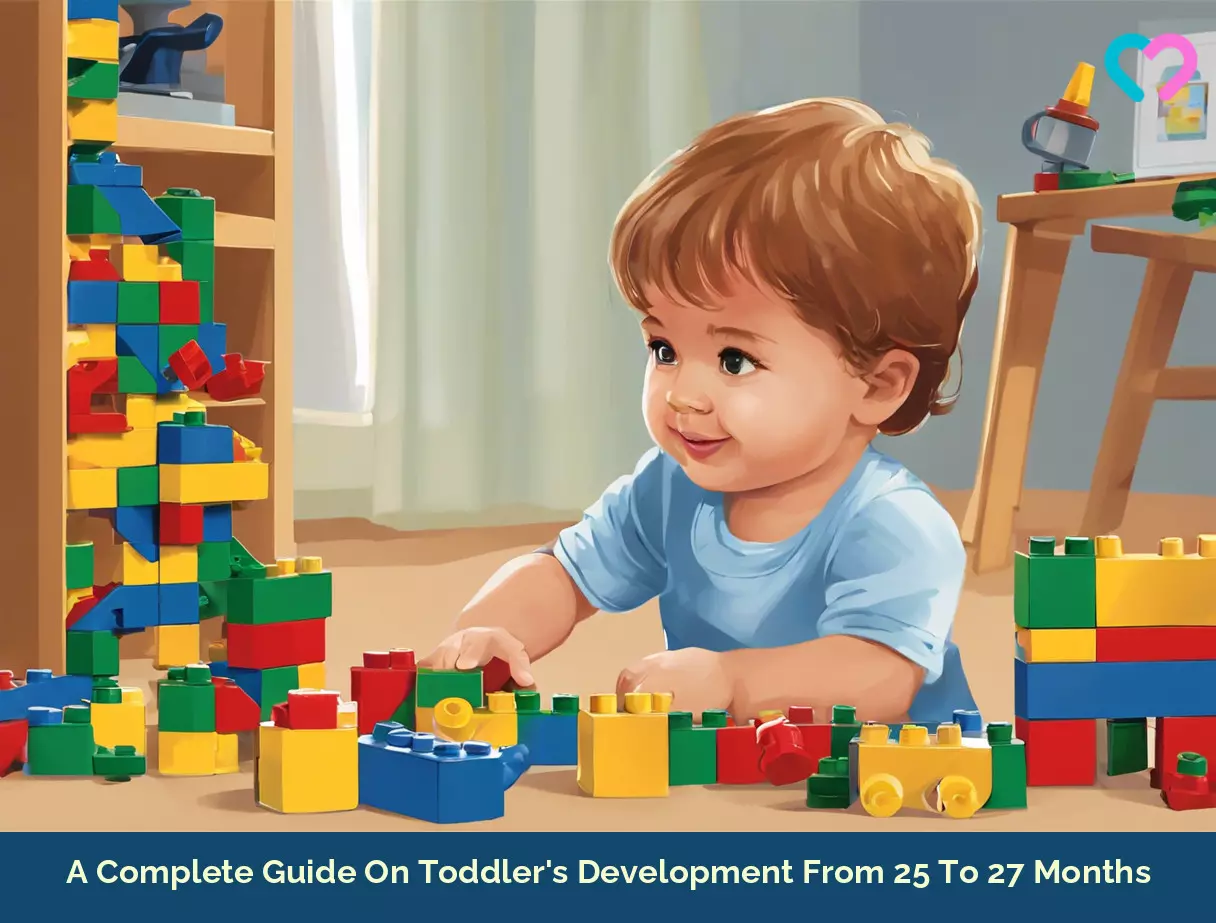
Image: Stable Diffusion/MomJunction Design Team
Watch as your toddler develops their speech milestones from 18 months to 2.5 years! Learn how to encourage their language development. This informative video covers the number of words a toddler can say at each age.
Personal Experience: Source
MomJunction articles include first-hand experiences to provide you with better insights through real-life narratives. Here are the sources of personal accounts referenced in this article.
i. 27 MONTH DEVELOPMENTAL MILESTONES + ACTIVITIES.https://www.youtube.com/watch?v=xNp_22uRk68
References
- Important Milestones: Your Baby By Thirty Months.
https://www.cdc.gov/ncbddd/actearly/milestones/milestones-30mo.html - Cara F Dosman et al.; (2012); Evidence-based milestone ages as a framework for developmental surveillance.
https://www.ncbi.nlm.nih.gov/pmc/articles/PMC3549694/ - Development milestones – your child at 3 years.
https://www.pregnancybirthbaby.org.au/development-milestones-3-years - Eating tips for children (3) – older toddlers.
https://www.betterhealth.vic.gov.au/health/healthyliving/eating-tips-for-older-toddlers - Typical sleep behaviour (5) – toddlers 2 to 3 years.
https://www.betterhealth.vic.gov.au/health/healthyliving/typical-sleep-behaviour-toddlers-2-3-years - Toilet Training.
https://www.hopkinsmedicine.org/health/wellness-and-prevention/toilettraining#:~:text=There%20is%20very%20little%20control - Emotional development: 2 year olds.
https://www.healthychildren.org/English/ages-stages/toddler/Pages/Emotional-Development-2-Year-Olds.aspx - My son is 27 months old and only speaks about 10 words. What is typical for this age? Should we be worried?
https://www.zerotothree.org/resource/my-son-is-27-months-old-and-only-speaks-about-10-words-what-is-typical-for-this-age-should-we-be-worried - Language development: 2-3 years
https://raisingchildren.net.au/toddlers/development/language-development/language-2-3-years - Stages of Play from 24–36 Months: The World of Imagination
https://www.zerotothree.org/resource/stages-of-play-from-24-36-months-the-world-of-imagination/ - Developmental Milestones: 2 Year Olds
https://www.healthychildren.org/English/ages-stages/toddler/Pages/Developmental-Milestones-2-Year-Olds.aspx - Thinking and play: toddlers.
https://raisingchildren.net.au/toddlers/play-learning/play-toddler-development/thinking-play-toddlers
Community Experiences
Join the conversation and become a part of our nurturing community! Share your stories, experiences, and insights to connect with fellow parents.
Read full bio of Dr. Mubina Agboatwalla
Read full bio of Jessica Albert
Read full bio of Rohit Garoo
Read full bio of Vibha Navarathna






